Half of EV imports in Korea run on Chinese batteries as EV fires rise
EV phobia is spreading across Korea following a Mercedes-Benz blaze that caused extensive damage
By Aug 09, 2024 (Gmt+09:00)
Samsung steps up AR race with advanced microdisplay for smart glasses


When in S. Korea, it’s a ritual: Foreigners make stops at CU, GS25, 7-Eleven


Maybe Happy Ending: A robot love story that rewrote Broadway playbook


NPS yet to schedule external manager selection; PE firms’ fundraising woes deepen


US auto parts tariffs take effect; Korea avoids heavy hit


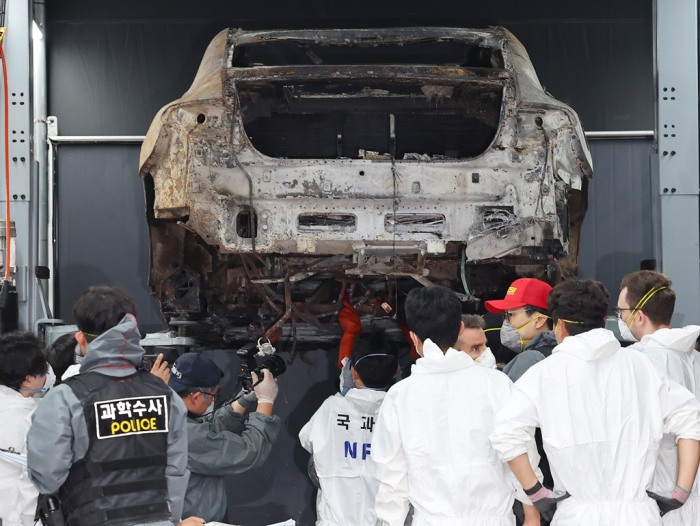
Of 58 electric vehicle models running on the streets of South Korea, 22 models are equipped with Chinese batteries, a survey showed on Friday.
According to a recent survey by The Korea Economic Daily and global research firm EV Volumes, a division of J.D. Power, 37.9% of the Korean and imported EVs use battery cells made by Chinese firms.
The survey showed that of 40 imported EV models, nearly half or 18 of the models are equipped with Chinese batteries.
Mercedes-Benz, a top foreign brand in Korea, uses Chinese batteries for six of its seven EV models sold in the country, accounting for 85.7% of its Korean sales.
The EQS SUV, which costs 255 million won ($186,131) a unit, was found to have batteries made by Contemporary Amperex Technology Co. Ltd. (CATL). The EQS is also reportedly planning to use AESC batteries from 2025.
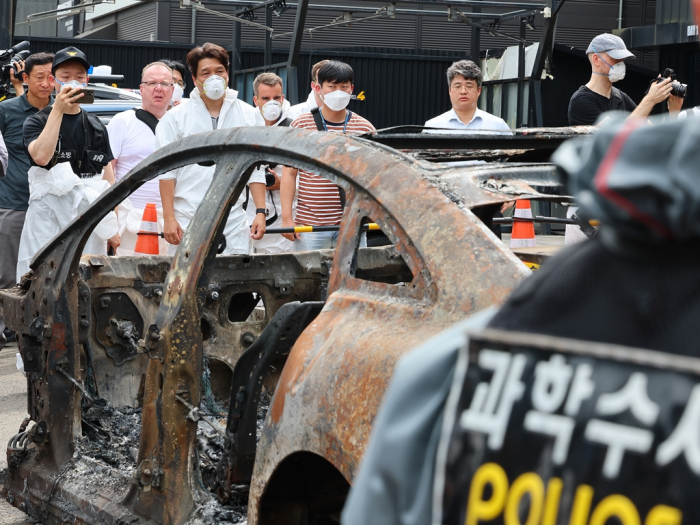
While CATL is the world’s top battery maker, AESC ranks 13th, garnering 0.5% market share as of the end of 2023.
Only one Mercedes EV, the EQC SUV, is equipped with Korean batteries, from LG Energy Solution Ltd.
The EQE, EQE SUV, EQS and EQS SUV models sold in Korea use CATL or Farasis Energy Inc. batteries.
Two EV models from Polestar, a unit of China’s Zhejiang Geely Holding Group Co., use Chinese batteries. The same goes for French firm Peugeot’s e-2008 and e-208, and BMW’s iX1 and iX3.
By contrast, Korea’s two largest automakers – Hyundai Motor Co. and Kia Corp. – equip 10 out of their combined 14 EV models with Korean batteries made by LG Energy Solution or SK On Co. The remaining four models use Chinese batteries.
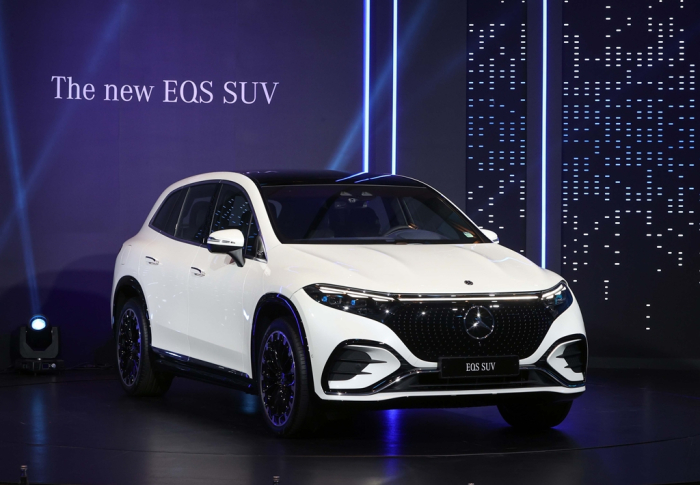
EV FIRES STOKE EV PHOBIA
The survey comes amid a growing EV phobia in Korea following a series of fires involving electric cars.
Last week, a Mercedes-Benz EQE electric sedan, with batteries made by Chinese company Farasis Energy, caught fire in the underground garage of an apartment building in the Korean city of Incheon.
The blaze took over eight hours to extinguish and damaged about 140 cars. Some 23 people were hospitalized due to smoke inhalation, police said.
Korea’s environment and transport ministries said on Thursday they will hold an emergency meeting next week to discuss fires involving EVs, including the blaze in Incheon that caused extensive damage, and draw up measures to prevent such incidents.
Industry officials said Korean authorities are expected to unveil new measures early next month to allay public concerns about safety in a sector already suffering a sales slowdown.
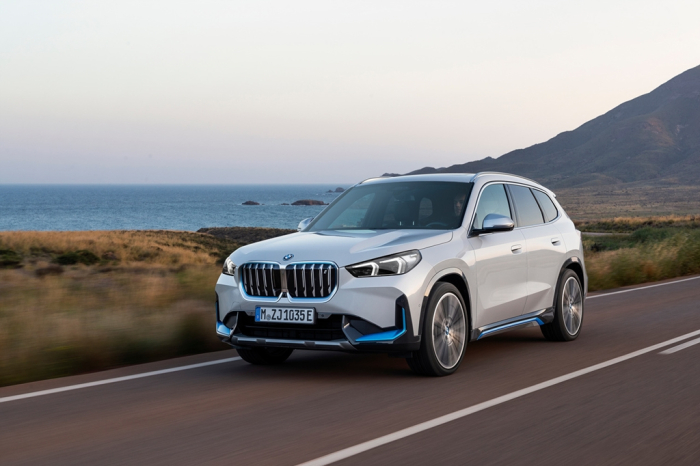
BATTERY MAKER IDENTIFICATION SYSTEM
Analysts said the Korean government needs to make it mandatory for EV makers to disclose the brands of batteries in their cars.
Automakers in Korea must provide certain information about vehicles, such as fuel efficiency, but only limited details on batteries and do not have to name the battery manufacturers.
It is said that several foreign automakers use batteries from leading battery makers for some of their EVs while sometimes alternating cheap Chinese products in the same models without disclosing the brands.
Korean automakers disclose the brand of batteries in all their EVs.
“China’s leading battery makers such as CATL have shown advanced battery technology, but there are many small and medium-sized companies in China that have not been verified,” said an industry official.
CATL and another Chinese battery maker BYD Co. are strong in low-cost lithium iron phosphate (LFP) batteries, however, their nickel-cobalt-manganese (NCM) battery technology, for which Korean battery makers have a competitive edge, still needs to be verified, he said.
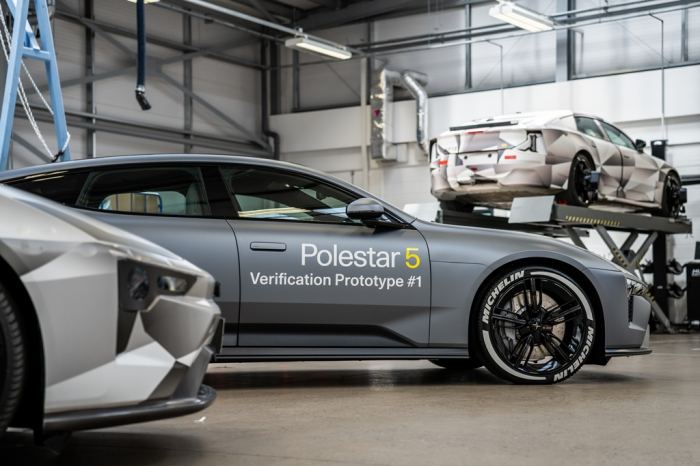
BATTERY TRACKING SYSTEMS IN US, EUROPE
According to EV Volumes, eight out of 15 Mercedes-Benz EV models, or 53.3%, sold in Europe, are equipped with batteries made by Korean or Japanese companies.
In the US, battery information disclosure is decided by each state and an increasing number of states are making it mandatory.
European Union countries plan to introduce a compulsory “battery passport system” in February 2027 that requires EV makers to report detailed information, including the expected battery life of their batteries in their cars, to the related authorities.
Beijing has a system that can track the entire process from battery manufacturing to disposal in China.
“In Korea, access to such data is so limited that information on battery manufacturers for EVs is sold at high prices,” said an industry executive.
The Korean government plans to require all EV makers to disclose battery information from 2027.
Write to Hyung-Kyu Kim, Woo-Sub Kim and Sang-Hoon Sung at khk@hankyung.com
In-Soo Nam edited this article.
-
 BatteriesLG Energy signs multi-billion-dollar LFP battery deal with Renault
BatteriesLG Energy signs multi-billion-dollar LFP battery deal with RenaultJul 02, 2024 (Gmt+09:00)
3 Min read -
 BatteriesSodium-ion batteries emerge as alternative to lithium, LFP batteries
BatteriesSodium-ion batteries emerge as alternative to lithium, LFP batteriesNov 27, 2023 (Gmt+09:00)
3 Min read -
 BatteriesLG’s $5.5 billion LFP, ESS battery plants in Arizona to kick off in 2026
BatteriesLG’s $5.5 billion LFP, ESS battery plants in Arizona to kick off in 2026Apr 04, 2024 (Gmt+09:00)
3 Min read -
 AutomobilesNew 2024 E-Class soon to arrive in Korea, land of Mercedes-Benz
AutomobilesNew 2024 E-Class soon to arrive in Korea, land of Mercedes-BenzDec 08, 2023 (Gmt+09:00)
2 Min read -
 Electric vehiclesSK On signs deal to supply NCM battery cells to Sweden’s Polestar 5 EV
Electric vehiclesSK On signs deal to supply NCM battery cells to Sweden’s Polestar 5 EVNov 06, 2023 (Gmt+09:00)
3 Min read -
 BatteriesKorean firms fret over growing adoption of Chinese LFP batteries
BatteriesKorean firms fret over growing adoption of Chinese LFP batteriesAug 28, 2023 (Gmt+09:00)
4 Min read


